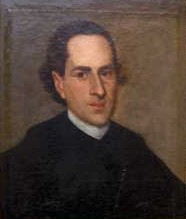Nicola Spedalieri

Nicola Spedalieri (actually Spitaleri ; born December 6, 1740 in Bronte , † November 26, 1795 in Rome ) was an Italian philosopher , Roman Catholic priest and author . He is considered a pioneer of human rights and popular sovereignty on a Christian basis.
Life and effect
Spedalieri was an oratorian student in Monreale ( Sicily , Kingdom of Sicily ) and studied theology at the archbishop's seminary . After ordination in 1764, he taught philosophy, theology and mathematics at the seminary. Some of his theological theses earned him suspicions of a lack of orthodoxy ; however, in papal Rome they were recognized and printed in 1772. Spedalieri then went to Rome in 1773.
In Rome, Spedalieri wrote poetry in addition to theological and philosophical writings and was accepted into the Accademia dell'Arcadia in 1774 under the pseudonym Melanzio Alcioneo . The self-portrait from 1774 testifies to his activity as a painter . Pope Pius VI. gave him an office at St. Peter's Basilica , which was connected with an adequate benefice , and commissioned him to write a history of the drainage of the Pontine plain . In the following years he wrote his most important apologetic works, in which he took up the human concerns of the secular Enlightenment , but tried to place them on a Christian foundation.
This line is also followed by the work that earned him fierce criticism but also lasting fame, De 'diritti dell'uomo - “On Human Rights”, in which he responded to the declaration of human and civil rights in revolutionary France . Here, for the first time, human rights given by creation and state authority emanating from the people are derived from Christian principles. Reactionary forces achieved the suppression of the book, which was initially widely circulated. In the young Italian nation-state , Spedalieri was seen by many as a champion of its foundations. In 1903 a monument was erected to him in Rome, created by the renowned sculptor Mario Rutelli . It is in Piazza Sforza Cesarini on Corso Vittorio Emanuele II .
When Spedalieri suddenly died at the age of 55, rumors spread that he had been poisoned.
Works (selection)
- 1778: Analisi dell 'Esame critico di Fréret , Rome
- 1779: Ragionamento sopra l'arte di governare , Rome
- 1779: Ragionamento sull 'influenza della religione cristiana sulla società civile
- 1784: Confutazione di Gibbon (philosophical reply to the attacks by Edward Gibbon regarding the charge that the Catholic Church was to blame for the fall of the Roman Empire)
- 1791: I diritti dell 'uomo (a Roman Catholic response to the declaration of human and civil rights in France)
literature
- Nicola Nicolini: SPEDALIERI, Nicola (Niccolò) , in: Enciclopedia Italiana , Rome 1936 ( online at treccani.it)
Web links
- Bronteinsieme: Nicola Spedalieri
- Spedalieri, Nicola . In: Dizionario di filosofia , Rome 2009 ( online at treccani.it)
| personal data | |
|---|---|
| SURNAME | Spedalieri, Nicola |
| ALTERNATIVE NAMES | Spitaleri, Nicola |
| BRIEF DESCRIPTION | Italian priest and philosopher |
| DATE OF BIRTH | December 6, 1740 |
| PLACE OF BIRTH | Bronte |
| DATE OF DEATH | November 26, 1795 |
| Place of death | Rome |
